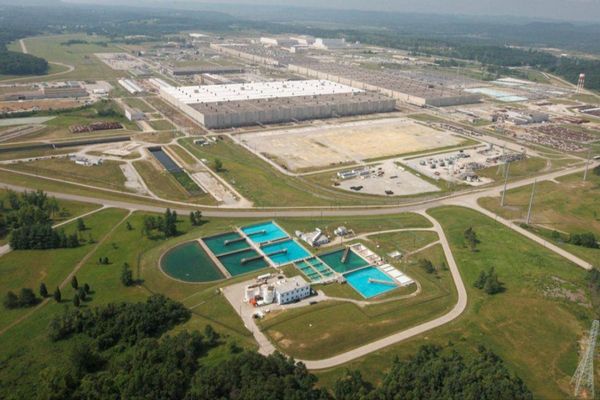

An executive of the Jewish Council of Australia has cautioned against exploiting community tensions for political gain, as a slew of anti-Semetic attacks have rocked the country.
A troubling arson attack in early December saw Melbourne’s Adass Israel Synagogue set alight and in two separate incidents in this month, offensive graffiti spray involving Nazi symbols and references was painted at a synagogue in southern Sydney as well as a house in the Inner West.
Just this week, a childcare centre was also set ablaze and graffitied with anti-Semitic slurs in Sydney’s south-east.
Thankfully, no one has been injured, but the slate of violence prompted Prime Minister Anthony Albanese this week to call a national cabinet, with reports authorities are investigating whether foreign governments or terrorist organisations are behind them.

As reported by the ABC, the snap meeting on Tuesday evening resulted in plans to introduce mandatory minimum sentences for terrorism offences and the display of hate symbols.
Australian Federal Police (AFP) Commissioner Reece Kershaw has confirmed its dedicated anti-Semitism taskforce, called Operation Avalite, is investigating 15 serious allegations and had received 166 reports of crime. (However, some of these were duplicates and others did not meet the threshold of a crime.)
“Anti-Semitism is a disease in our community, and it needs to be aggressively attacked because history shows what happens when action is not taken against those who fuel fear and terrorise others,” he said.
Condemning the recent string of attacks, Max Kaiser, executive officer of the Jewish Council of Australia, noted the incidents follow a time of immense violence in Gaza.
“No matter your opinion on this issue, it is never acceptable to target Jews or to blame Jewish people generally for the actions of the Israeli state,” he said in a statement last week.
“The media and politicians need to take this incident as a wake up call to act more responsibly in distinguishing between Jews in Australia and the government of Israel.
“The Jewish community is not a monolith and we refuse to be used as political footballs.”
Speaking to PEDESTRIAN.TV, Kaiser elaborated there are concerns following recent events about the increasing politicisation of the Jewish community.
And, as he observes, neither of the major parties have been seemingly immune to these tactics.
“Especially before we saw the recent change in Australian government policy, we had the Albanese government hiding behind the Jewish community for their inaction on Israel. That they would say, ‘oh, you know, we don’t want to take a stronger stance against Israel and their violations of international law because of the Jewish community’, using the Jewish community as a sort of cynical shield,” Kaiser said.

“And now, on the other hand, we very actively have Peter Dutton and the Liberal Party presenting themselves somehow as defenders of Jewish people and accusing the Albanese government of encouraging anti-Semitism because they have started to be a little bit more critical of Israel on the international stage.
“So they’re very obviously using Jewish people in order to attack the government.”
The discourse surrounding the Israel-Palestine conflict has only intensified broader racial tensions in Australia and stoked troubling racial sentiment across the board, he pointed out.
A ceasefire agreement was finally reached last week after 15 months of warfare. Three Israeli hostages of Hamas and 90 Palestinian prisoners of Israel have now been released, according to The Guardian.

An important step for politicians moving forward is to “stop using the war and using different ethnic groups in order to further their political agendas”, Kaiser said.
“We’ve seen both major parties do that in terms of Jews, but also in terms of migrants. Both have gone very extreme and anti-migrant in terms of their rhetoric around refugees and asylum seekers in particular and that just feeds that broader racial climate,” he remarked.
This has had damaging effects, creating an environment in which different ethnic and religious groups are set against each other.
“There’s this real issue with being seen to sort of favor Jewish people and to respond to Jews and anti-Semitic incidents in a way that Islamophobia or anti-Palestinian racism doesn’t … and the response that both parties are pressing now is really a law and order response,” Kaiser said.

“They think more police, treating everything as a terrorist incident is going to make a difference — it might make some marginal difference — but really, it doesn’t address those underlying issues of racism in Australian society. And it doesn’t address that politicians have been playing into it.”
Negative attitudes towards Jewish people have increased to 13 per cent in 2024, up from 9 per cent in 2023, per the Scanlon Foundation’s recent Mapping Social Cohesion report.
Meanwhile, more than a third (34 per cent) of adults have a somewhat or very negative attitude towards Muslims, compared to 27 per cent in 2023.
Highlighting a national anti-racism framework put forward by the Human Rights Commission, Kaiser advocated for a comprehensive, “joined-up” approach to combat all forms of racism.
He stressed the need for both the media and politicians to take responsibility for the narratives they propagate.
“So much of the media and politicians set different groups against each other. We’ve already seen that in response to the recent attacks on the synagogues, that a lot of right wing media and right wing zionist groups are stirring up Islamophobia and trying to blame the protest movement.
“That just increases tensions, makes things worse, and doesn’t recognise that we’re actually all in this together.
“Increasing racism against one lot of people is just going to increase racism for all of us, so I would recommend a more joined up approach to fighting all forms of racism.”
Lead image source: Tracey Nearmy/ Getty Images
The post ‘Not Political Footballs’: Jewish Leader’s Plea To Politicians Amid Rising Anti-Semitic Attacks appeared first on PEDESTRIAN.TV .







